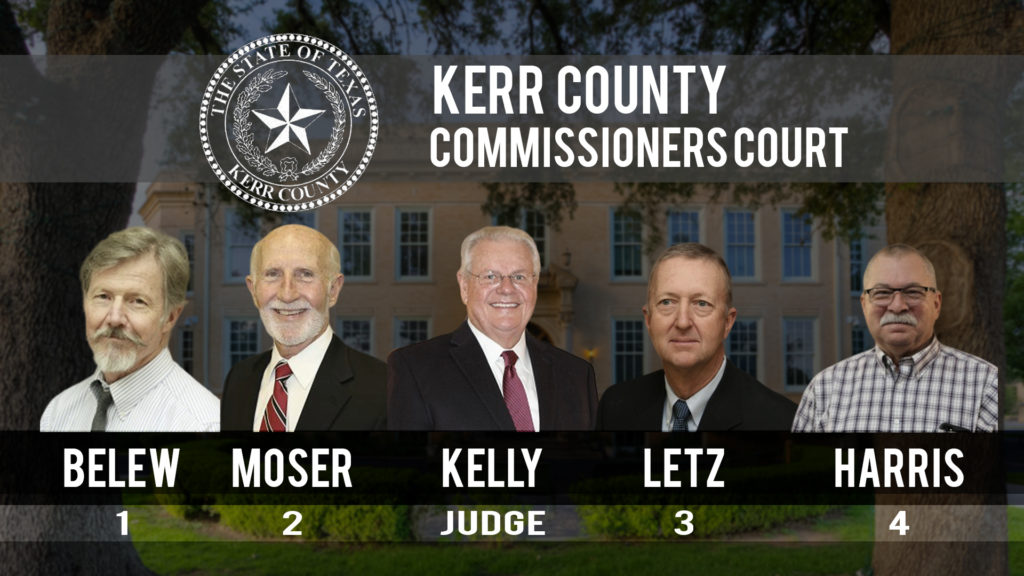New documentation has been received by Kerrville United via a public records request that seems to confirm that Commissioners potentially violated the Open Meetings Act by discussing matters in Executive Session that should have been discussed in open session. Commissioners have repeatedly denied that anything improper occurred during the October 15 meeting, during which they voted to close the Animal Shelter on Saturdays, to adjust operating hours on the other days of the week, and to institute new volunteer policies that make it more difficult for volunteers to serve at the shelter. The records released to us this week show that commissioners entered into executive session to discuss “personnel matters” but in fact discussed general shelter policies, and those subjects are not covered by the Open Meetings Act authorization for the Court to deliberate in secret.

Background on Open Meetings rules
On October 15, County Commissioners held a regularly scheduled public meeting at the Kerr County Courthouse. Numerous matters were on the agenda to be discussed, including one curious agenda item that had not been previously publicized:

County government is mandated to operate according to numerous state laws, one of which is known as the Open Meetings Act, found in Chapter 551 of the Government Code. The Open Meetings Act was adopted in 1967 as a way to make governmental decision-making accessible to the public. The Act requires all governmental deliberations and decision-making to be held in open, public forums, except where expressly, specifically authorized for closed (non-public) sessions.
Some reasons that a Commissioners Court (or a city council, or a school board) might go into closed session could be:
- Personnel matters — appointment, employment, evaluation, discipline, etc
- Consulting with attorney — seeking legal advice
- Deliberations concerning the sale of real estate or negotiations of contracts
- Security matters
- Pending or current litigation
- Numerous other exceptions
These exceptions make sense. Discussing these things in public could undermine the county’s bargaining power or put them at a disadvantage in a lawsuit or a negotiation. And the privacy of county personnel should be protected, hence the exception for personnel matters.
And, importantly, no action can be taken in Executive Session. All votes must be held in public session after the deliberations have been concluded. So even if the public cannot hear the discussion, they always see the votes being cast in public, open session.
The Open Meetings Act is very specific about what can be discussed in those closed Executive Sessions. Moving the meeting into private does not give the governing body carte blanche to discuss everything under the sun. The body can ONLY discuss the specific items that called for them to enter executive session. And it’s illegal to go into a closed meeting under one pretense only to discuss other items once the public has been removed.
AUTHOR’S NOTE: As a current member of the Kerrville EIC, and after having served on other governmental boards and commissions, I can speak from personal experience in these matters. I have personally been in executive session when another topic was brought up, and the staff and/or attorneys present quashed that part of the discussion. These rules are taken very, very seriously inside executive session.
Moving the meeting into closed session
A governmental body, such as the Commissioners Court, can go into Executive Session by doing two simple things…
- Moderator announces that a closed meeting will be held, AND
- Identifies the section or sections of the Open Meetings Act under which the closed meeting will be held.
(Source: Texas Government Code Section 551.101)
Unfortunately, these two things don’t happen regularly in Commissioners Court. For example, in a recent meeting held on September 9, 2019, neither the agenda items nor the spoken announcement made any mention of which section was being invoked to enter into Executive Session. See the agenda items and the verbatim transcript below.



In this case displayed above, it’s obvious to seasoned veterans of government meetings that they entered into Executive Session under Section 551.074, personnel matters, and Section 551.071, attorney consultation, but the law was not followed since it requires an announcement about the specific statute or statutes authorizing a closed meeting.
(Since we don’t have the transcript of the October 15 meeting, we don’t know whether or not the closed meeting was announced properly. We hope that transcript will be released soon — it’s been over three weeks since this meeting took place.)
Again, once a body enters into Executive Session, it is only authorized to discuss the specific item or items that legally allowed the body to go into this closed portion of the meeting. And no action or vote can be taken. The body must go back into public session to take any official action.
Problems on October 15
Unfortunately, since the county does not record their meetings in video format, and since the minutes from this meeting have not been posted publicly (some three weeks later), we do not have an exact record of what transpired or what was said — either written or recorded. So, when we first looked into this meeting, we had only the recollections of attendees along with newspaper accounts of the meeting.
To clarify matters, we wrote to the County Attorney, Mrs. Heather Stebbins, and inquired about what section of the Open Meetings Act was invoked for the Commissioners to be legally able to adjourn to closed session. She explained that the Commissioners invoked Section 551.074 (personnel matters).
Under this section of the law, the court would be authorized to discuss a specific employee and matters pertaining to that employee, such as evaluations, discipline, reassignments, salaries, etc. However, the law does not allow for generic discussions about a class or group of employees. Section 551.074 is designed to protect the privacy of government employees, but it is not meant to protect the governmental body itself.
In addition, the personnel exception allows only the discussion of a particular person or persons in a closed meeting. A governmental body may not discuss general policies regarding an entire class of employees in a closed meeting held under the personnel exception. Such general policies must be addressed during the open portion of a meeting.
Texas Open meetings Act Laws Made Easy. Texas Municipal League. Zindia Thomas, Assistant General Counsel. 2017.
When public session resumed, the county took a vote and unanimously passed an order to amend the volunteer policy at the animal shelter, and to change the hours and days of operation at the shelter. This has nothing to do with the protections afforded under Section 551.074 of the Open Meetings Act. Since no discussion of those matters occurred during open session, yet the commissioners’ vote was unanimous, it suspiciously looked at though discussion of shelter policies had taken place in closed session.
County response misses the point
County spokeswoman Lisa Walter denied that any decisions were made in executive session, but didn’t deny that these items were discussed. In an October 22 article in the Kerrville Daily Times, she said, “They weighed and measured it very carefully. Yes, they discussed personnel matters related to this in executive session as is allowed by law, but no decision was made in executive session. That’s illegal, and our local county elected officials follow the Open Meetings Act to the letter.”
In that same article, Precinct 2 Commissioner Tom Moser was quoted as saying, “I would like to make it very clear that the court did not make any decisions in executive session. All decisions and actions are taken only in public court sessions as is required by the 2017 Texas Open Meetings Act.”
Both of these responses miss the point. No one is alleging that a vote was taken in Executive Session. We have no evidence to think that’s the case. However, the Open Meetings Act makes it an offense to even discuss those policy matters behind closed doors.
Determining what happened in Executive Session
Since the minutes and/or recordings of an Executive Session proceeding cannot be released without a court order, Kerrville United had no way to ascertain what exactly transpired behind closed doors. However, we located a Texas Attorney General’s Opinion numbered OR2007-02567 and dated March 7, 2007. In that legal opinion, the Attorney General’s office stated,
“…Records discussed or created in a closed meeting, other than a certified agenda or tape recording, are not made confidential by chapter 551 of the Government Code.”
Texas Attorney General Opinion No. OR2007-02567
That legal opinion made it clear that any notes, reports, data, or other written materials from the closed session must be made available via an open records request. So, we submitted such a request on October 24 — an official public records request asking for all notes or other documentation created or used during the Executive Session. On November 5, we received a response. We received transcriptions of handwritten notes taken by County Attorney Heather Stebbins. These notes were taken during the closed portion of the meeting on October 15.


Notes confirm discussions regarding numerous topics that are not covered by Section 551.074. The non-qualifying subject matter included:
- Animal adoptions
- Photos of animals
- Phones in kennel area
- Number of volunteers allowed at any one time
- More specific volunteer procedures
- Comp time
- Website
- Closing on Saturdays
- Staff lunches
- Preparing a court order to change times of operation, reduce number of volunteers, “eyes on at night for pickup”
This stunning revelation makes it clear that Commissioners discussed numerous topics that were not related to a specific employee, as Section 551.074 allows. Commissioners discussed general policies related to the Animal Shelter and outlined a Commissioners Court order to change those policies. This appears to be a violation of the Texas Open Meetings Act.
What should have happened? To comply with the law, after the discussion concerning personnel matters was completed, Commissioners should have reconvened in public session to discuss the shelter policies. This simple action would have prevented all of the consternation about the “deliberations in secret.”
Special Note: No accusation of impropriety is being leveled at the County Attorney, Mrs. Heather Stebbins. The Commissioners control the agenda and the proceedings of the meetings — not Mrs. Stebbins. The County Attorney has been completely transparent and has cooperated fully with all of our records requests and has answered all of our questions without hesitation. We commend Mrs. Stebbins for her transparency and commitment to acting on behalf of the people of Kerr County.
Kerr County’s response to this article
On Thursday, we sent an email to the County Judge, Commissioners, and County Attorney to let them know that this article was coming, and to offer them an opportunity to respond. Precinct 3 Commissioner Jonathan Letz called us on Friday morning to explain the county’s side of this story. He has given us permission to summarize his comments here.
According to Commissioner Letz, he put this item on the agenda (1.24 on October 15) to discuss sensitive personnel matters relating to some accusations that had been leveled at various staff members at the shelter. According to Letz, all of the discussion in Executive Session centered around these personnel issues and were so intertwined with personnel matters that it would have been difficult to discuss any of it in open session.
After speaking with Mr. Letz, we understand that this was a complicated matter and we have no doubts that it was proper to discuss those personnel matters in private session. However, we still feel that the county erred by not returning to public session to discuss the changes in policies. After all, each of the issues described in the County Attorney’s notes could be discussed after the personnel-related issues had been related to Commissioners. If this logic is followed — operating hours and volunteer policies affect staff, therefore it’s a personnel matter — then almost everything the county does could be considered a personnel matter, because county personnel implement ALL of the county’s programs and policies in some way.
What’s Next?
Kerrville United invites the Commissioners to respond to this article when they discuss “Commissioners’ Court Rules on Procedure, Conduct and Decorum” on November 12. Questions remain, including,
- How could this agenda item have been handled more transparently?
- Why hasn’t the legal procedure been followed in other Commissioners Court meetings in the past?
- How can the county increase transparency when issues like this come up again?
- How can we increase the speed of which transcriptions/minutes are released?
- Why didn’t the county consult with its animal services advisory board or any other interested parties before coming to this decision?
Our elected officials are held in positions of trust. We must be able to trust them to abide by the law — both the spirit of the law and the letter of the law. The Open Meetings Act mandates that all public business be discussed in public. These closed-door deliberations were improper and demonstrate a violation of the public trust. That trust must be restored in order for the Commissioners Court to function effectively.
One way that trust can begin to be restored is by the county investing in and installing video recording systems in the Commissioners Courtroom. By allowing more sunlight onto the deliberations that take place in Commissioners Court, the public can effectively hold their representatives accountable. More transparency in government is always a good thing. Sunlight is the best disinfectant. We strongly urge the county to take steps to make their meetings open to all citizens by filming and broadcasting these meetings immediately.
AUTHOR’S NOTE: Your author, Aaron Yates, owns and operates a videography business in Kerrville. The author has no interest in obtaining any type of compensation or any contracts from the county for the installation or operation of a video recording system. On the contrary, we have offered free consultations and the donation of some equipment should the county decide to proceed with the installation of a video recording system.
In addition to this concrete step towards more transparency, we also believe it is appropriate for the court and/or the commissioners to apologize for this mistake in judgment. The Animal Services Department issues are sensitive, emotional, and polarizing, and managing those decisions is stressful and difficult for the court. However, just because a matter is politically difficult does not mean that the deliberations can be hidden from public view. We invite the commissioners to apologize to their constituents for failing to act transparently on this issue. The meeting on November 18 is the perfect time to begin accounting for this transgression.
References
- “County says facts drove decision on shelter hours.” Kerrville Daily Times. October 22, 2019.
- Commissioners Court Agenda for October 15, 2019
- List of other news articles and primary sources used in this article
Authored by Aaron Yates on behalf of Kerrville United




